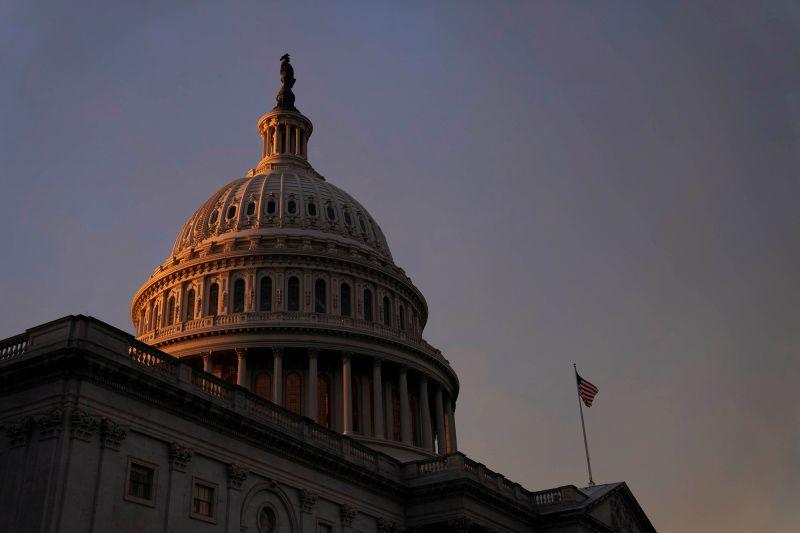Opinion: This congressional office is a success. The GOP wants to gut it anyway | CNN
By: Casey Michel (CNN)


The corrupt, venal Republican Party demonstrates once again its contempt for the American people.
Trolling, taunting, spamming, and off topic comments may be removed at the discretion of group mods. NT members that vote up their own comments, repeat comments, or continue to disrupt the conversation risk having all of their comments deleted. Please remember to quote the person(s) to whom you are replying to preserve continuity of this seed. Any use of the phrase "Trump Derangement Syndrome" or the TDS acronym in a comment will be deleted.

Editor's Note: Casey Michel is the author of "American Kleptocracy: How the US Created the World's Greatest Money Laundering Scheme in History," and is at work on a book investigating foreign lobbying in Washington. The opinions expressed in this article are his own. Read more opinion at CNN.
CNN —
Earlier this month, House Republicans unveiled a new rules package, announcing their priorities for the new congressional session. Spearheaded by new House Speaker Kevin McCarthy, the package bundles a number of partisan GOP priorities.
It also pledges to do something that hasn't gotten nearly enough attention: gut the Office of Congressional Ethics (OCE), arguably the most successful ethics oversight body in Washington.
The new rules promise two sweeping changes for the OCE, which is a non-partisan, independent federal body tasked with pursuing congressional ethics investigations.
First, they would introduce term limits on the board of the OCE. Secondly, they would restrict the window in which the OCE can hire its investigative staff to the first 30 days of any new congressional session.
While these changes might sound minor, they are anything but. The term limits would effectively "force out" the majority of Democratic members, sending Democrats scrambling to search for replacements, a process that could take months.
A coalition of some two dozen political advocacy groups complained in a letter to the full House of Representatives that the new changes, which would require three of the four Democrats who currently sit on the OCE's board to immediately vacate their positions, render the body virtually impotent.
"It would take time to fill these vacancies and, in the meantime, OCE's ability to efficiently conduct investigations and publish reports would be severely diminished," the coalition of nonprofit groups wrote.
Since the OCE board needs to approve all hires for its investigative staff, the new 30-day limit would almost certainly lapse without many - or perhaps even any - new hires. The end result would be an OCE that has been rendered a shell of its former self.
The proposals are shameful, even reprehensible. And they're also myopic. As Craig Holman, an ethics expert with Public Citizen, told the New York Times, "These are measures that will render the ethics office ineffectual and which no member, from either party, should support."
While the OCE hasn't gotten nearly as much attention as other investigative bodies in Washington in recent years, it has proven itself time and again to be one of the most effective, if unsung, success stories in terms of ethics oversight - especially as it pertains to investigating how foreign powers target and manipulate American lawmakers.
Founded in 2008, the OCE was an outgrowth of the greatest ethics scandal of the era, which centered on lobbyist Jack Abramoff and his corruption and kickback schemes in Congress. After it became clear how little was actually being done by the Ethics Committee - which is nominally tasked with policing House members - to stop Abramoff's network, lawmakers created the OCE as a way to get the job done.
Composed of both Republicans and Democrats, the OCE can conduct its own investigations, and recommend actions to the House Ethics Committee. While the OCE doesn't have as many investigatory powers as counterparts on the House Ethics Committee - for instance, it can't subpoena or compel witnesses - it's been broadly viewed as one of the greatest ethics success stories of the era.
"The House Ethics Committee is often a puppy dog, rather than a watchdog," one ethics expert said. "If you're looking for a success story on ethics, the OCE is that success story."
While the OCE routinely investigates domestic scandals, that remarkable success was seen most spectacularly a few years ago, when the OCE led an investigation of arguably the greatest foreign lobbying scandal in congressional history.
In May 2013, nine House members and dozens of staffers traveled to Azerbaijan, a country that remains overseen by one of the most kleptocratic, brutal regimes on the planet. It was, as one outlet said, "among the biggest concentrations of American political star power" the region had ever seen.
According to federal filings, the trip was supposedly paid for by a series of American non-profits who were simply interested in improving US-Azeri relations.
The trip featured sumptuous dinners, as well as souvenirs for the American lawmakers - including crystal tea seats, silk scarves, and expensive rugs - that far exceeded the financial limits for gifts legislators are allowed to accept. Questions soon began circulating about how these non-profits could have afforded such an extravagant junket.
After the US lawmakers returned, the OCE opened an investigation that offered an unparalleled look into how kleptocratic dictatorships try to sway American legislators in a bid to shape US policy.
The OCE investigation revealed that the American non-profits which claimed to finance the trip were simple middle-men. In reality, Azerbaijan's state-run oil firm - which is effectively the regime's piggy bank - funneled hundreds of thousands of dollars to and through the non-profits, using them as effective front-men to hide their financial tracks.
And it's not hard to see why Azerbaijan was willing to fund the trip. No sooner were the lawmakers back in Washington than many of them began stumping for Azerbaijan's interests, even going so far as to try to exempt Azerbaijan from certain sanctions programs.
There's no evidence that US legislators were aware of the payment scheme. But they - and members of the House Ethics Committee, which actually tried to block publication of the OCE report - showed little interest in determining who had actually financed the trip.
Without the OCE, it's unlikely there would have ever even been an investigation into who had secretly bankrolled lawmakers' travels. And that probe laid the groundwork for investigations into how countries like Russia try to interfere in American politics, and the loopholes they exploit to do so.
Unsurprisingly, thanks to its successful investigations into both Democrats and Republicans, the OCE made many enemies in Washington. We've seen efforts throughout the years to restrict the OCE's oversight abilities - including a bid by House Republicans just a few years ago, who attempted to weaken the OCE before backing down.
This time around, the effort to defang the OCE seems likely to stem from concerns about potential investigations into GOP members' actions related to the January 6 insurrection - and possibly probes into controversial members like Rep. George Santos (R-NY) and lawmakers who refused to comply during the last Congress with subpoenas to appear before the January 6 committee, including McCarthy and other top Republicans. The referrals by the January 6 Committee appear to have been rendered moot however, now that a new session of Congress was seated earlier this month.
The Republican House leadership has declined media requests for comment about the decision to gut the office. Meanwhile Santos, who is facing a multitude of ethics complaints over campaign finance irregularities and fabrications about his past, among other issues, told one media outlet he thought the move to defang the Office of Congressional Ethics was "fantastic."
Whatever the reason, proposals to gut the OCE are a salvo against transparency in Washington - especially as it pertains to how foreign autocrats manipulate, and even try to corrupt, US legislators.
With House Republicans threatening to kneecap the body, Americans risk being plunged into the dark about the corrupting influence of foreign money in US politics once again.

Tags
Who is online
39 visitors


If there was ever any doubt about the depth of the corruption of the Republican Party...
lucky for us they've managed to retain their clownservative xtian family values...
George Santos is the perfect example of republican ethics.
Of course, let’s trash the one part of congress that actually seems to work somewhat effectively. Can’t have that shit, otherwise Americans might think their reps are actually partly earning their fat 6 figure salaries and world class benefits package.
I don't know how it could be done, but to have any real implications a Congressional Ethics authority would have to be taken out of the hands of Congress themselves. I'm almost certain it would take a change at the Constitutional level and that's never going to happen.
I agree , it does have to be taken out of congresses hands , because currently its like the fox guarding the hen house to use that euphemism .
i think legislation could be passed and enacted that a committee be formed where as all 3 branches of government are represented and the executive get to place a member , the house gets to seat a member and the senate gets to seat a member , and the judicial branch should seat a member . a final tie breaking seat should be one that both the house and senate can agree on . i also think that the judicial branch member should be name the head of the committee simply because they would be the ones to weigh the evidence on if an investigation is needed . and this committee should have a term limit of 1 term , and the term should last no more than 5 years and no person can sit on the committee more than once .
as to exactly what powers it would have can be hashed out by the 3 branches .